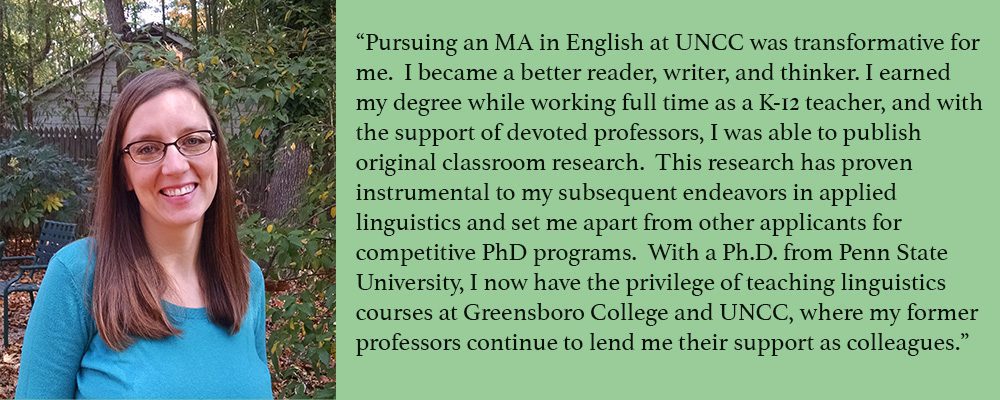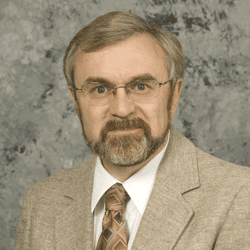M.A. in English: Applied Linguistics
Applied linguistics will concern itself with the ‘real-life’ particulars of language, in practical matters such as how decisions are made based on language, how people self-identify or deal with one another through language, and how language works in specific contexts. Applied linguists are typically interdisciplinary, working in fields such as computational linguistics (extracting patterns from large language corpora, making computers interact with people), forensic linguistics (analyzing legal language, identifying voice prints, determining if someone was speaking truthfully, etc.), language acquisition and socialization (researching second language learning and cultural development), language teaching (second language, teaching reading and writing), language and identity (analyzing the role of language in shaping the identities of individuals and groups), language therapy (e.g. after a stroke), language across the lifespan (the effects of aging on language), sociolinguistics (language change and variation in relation to sociocultural context), and pragmatics (language use in specific situations and for specific purposes and the cognitive processes that make use of social and cultural information)
There are many subdisciplines within applied linguistics, and new discoveries in science will create yet more. Advances in brain research gave rise to the field of neurolinguistics in the seventies; current strides in genetics and paleoanthropology are now necessitating the new field of paleolinguistics – the study of whether certain hominins could talk and how their language would have gone beyond animal communication.
Students completing the M.A. concentration in Applied Linguistics will be prepared for Ph.D. studies in linguistics as well as careers in fields as diverse as intelligence, forensic document analysis, publishing/journalism, language and information technology, speech therapy, technical copy editing, lexicography, and library science.
For more information about the requirements of the concentration, consult the catalogue. You can find fuller descriptions of recent linguistics courses here. We also offer a graduate certificate in applied linguistics.
Our students in applied linguistics have produced research on a wide array of topics….
- Second Language e-Learning at CPCC
- Conflict and the Construction of the Young Feminist Identity on Tumblr
- The Role of Traditional Grammar Teaching within the Communicative Approach of Teaching English as a Second Language
- The Effects of Stereotype Threat on Mixed-Gender Conversation
- Defining the Genre of the U.S. Policy Issues Webpage with a Cross-Linguistic, Contrastive Analysis
- Appalachian Dialect in Harriette Simpson Arnow’s Novel Mountain Path
- Cross-generational Value Discrepancies and Alignments of three Bengali families living in the U.S.
- Analysis of the Errors Committed by Arabic Speakers in the Use of English Articles
- Metalanguage, A Multilingual’s L1: An Examination of Language Learning and Its Impact on The First Language
- Of Pumpkin Spice Lattes, Hamplanets, and Fatspeak: The Venting Genre as Support and Subversion on Reddit’s r/Fatpeoplestories
- Language Policy in Hawai’i and the Philippines
- From Sign to Episteme: The Semiosis of Jihad
- Macklemore, Iggy Azalea, and Contested Authenticity with the Hip-Hop Discourse Community
- Narrative and Storytelling Patterns in Aphasic Speakers: Stroke Story vs. Personal Story
- The Construction of Race and Identity in the American Stand-up Comedy of Margaret Cho and George Lopez
- Appalachian English for Appalachian students: Language Variation Education in Secondary Public Schools
- Americans and Others: Narrative Constructions of Identity in Republican Discourse of U.S. Immigration
- Margery Kempe
- Impoliteness and Classroom Discourse
- A Cross-cultural Analysis of Obituaries
- Spanish in the Linguistic Landscape of Charlotte, NC
- Linguistic Human Rights and Mother Tongue Education
Linguistics Faculty
Want to Learn More?
Contact Prof. Pilar Blitvich
245H Fretwell
Tel.: 704-687-2126
pgblitvi@uncc.edu





